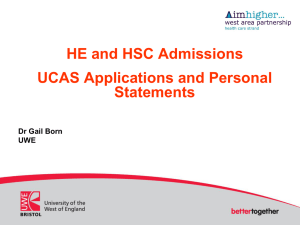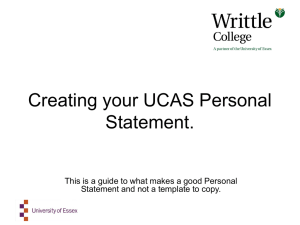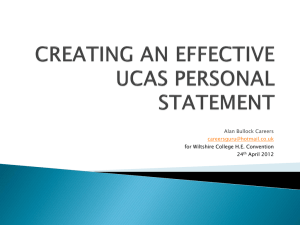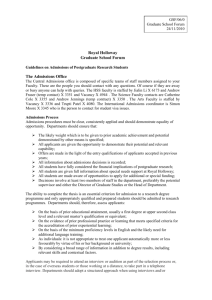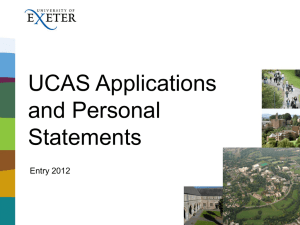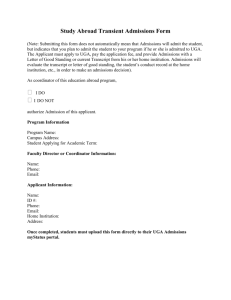Case Study 10 - Royal Holloway, University of London, June
advertisement
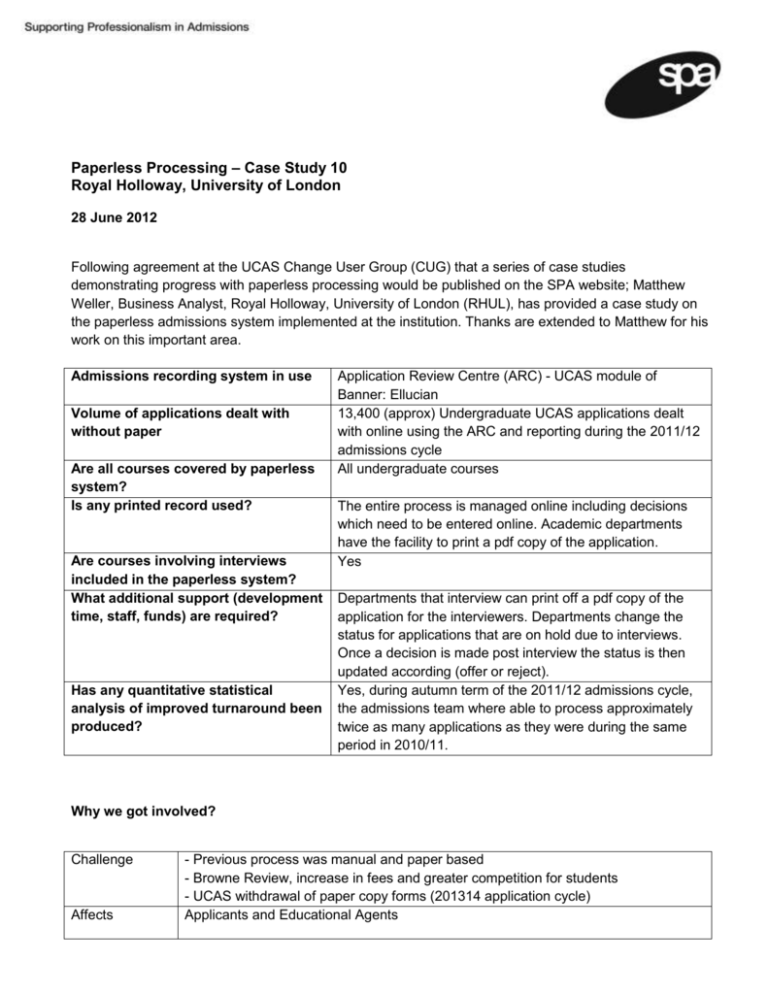
Paperless Processing – Case Study 10 Royal Holloway, University of London 28 June 2012 Following agreement at the UCAS Change User Group (CUG) that a series of case studies demonstrating progress with paperless processing would be published on the SPA website; Matthew Weller, Business Analyst, Royal Holloway, University of London (RHUL), has provided a case study on the paperless admissions system implemented at the institution. Thanks are extended to Matthew for his work on this important area. Admissions recording system in use Volume of applications dealt with without paper Are all courses covered by paperless system? Is any printed record used? Are courses involving interviews included in the paperless system? What additional support (development time, staff, funds) are required? Has any quantitative statistical analysis of improved turnaround been produced? Application Review Centre (ARC) - UCAS module of Banner: Ellucian 13,400 (approx) Undergraduate UCAS applications dealt with online using the ARC and reporting during the 2011/12 admissions cycle All undergraduate courses The entire process is managed online including decisions which need to be entered online. Academic departments have the facility to print a pdf copy of the application. Yes Departments that interview can print off a pdf copy of the application for the interviewers. Departments change the status for applications that are on hold due to interviews. Once a decision is made post interview the status is then updated according (offer or reject). Yes, during autumn term of the 2011/12 admissions cycle, the admissions team where able to process approximately twice as many applications as they were during the same period in 2010/11. Why we got involved? Challenge Affects - Previous process was manual and paper based - Browne Review, increase in fees and greater competition for students - UCAS withdrawal of paper copy forms (201314 application cycle) Applicants and Educational Agents Impact A successful solution would - Slower decisions and lack of transparency of status Staff - Excessive focus on manual, non value added tasks - Lack of visibility on applicant status in the flow - Increased risk of losing applicants (particularly the best applicants) - Frustration amongst internal teams (lack of transparency) - Environmental and financial impact - Improve effectiveness and efficiency of internal processes - Retain flexibility for central admissions or departments to make decisions - Be flexible enough to adapt to new organisational processes - 21st century University Royal Holloway, Application Review Centre and UCAS RHUL has a central admissions team responsible for processing UCAS applications on the Banner Student records system. Application decision- making is devolved to most academic departments, although the central admissions team does make decisions for some departments. The Application Review Centre (ARC) is an online application that allows users to review UCAS application data and allows Admissions Tutors to record actions against an application (e.g. conditional offer, reject, on hold). The ARC uses live data from the Banner student record system. RHUL has configured the UCAS interface to load data into the student records system every week day at 5:30am. Actions entered by Admissions Tutors in the ARC are not fed directly back to UCAS. Actions are checked by central admissions staff who enter the decisions onto Banner which are then uploaded to UCAS (and visible by the applicant). The ARC includes other non- UCAS data that is useful to admissions tutors. For example this includes details of other supporting documentation submitted and whether the applicant has been a student at RHUL before. New business processes introduced Decision- makers use data rather than the paper to review applications – RHUL no longer relies on the paper copy from UCAS being the trigger for the process. Departments have access to application data as soon it is loaded onto the student records system. Departmental actions made ‘online’ – previously decisions were made on the paper application and returned to central admissions using the internal post. Reporting to identify departmental actions and application status: o Departmental decisions (conditional, unconditional, reject) o Departmental holds (interviews, gathered field) o Admissions Requests (qualifications analysis) o Unprocessed applications (null status) Parallel processing of joint applications – previously paper applications were reviewed in ‘series’ which meant it took far longer to reach a decision. Online referral process – departments can refer an application through the ARC to another colleague for review. Reporting to measure turnaround time and identify bottlenecks o Date loaded into Banner o Date action taken by Department o Date decision entered by central admissions Paperless applicant and student record – replacing the paper files. Comparison of the old / new joint application process This diagram highlights how the changes to the business processes highlighted above lead to a faster application decision. Benefits gained Faster application turnaround for applicants and staff Remote review and decision-making of applications Consolidation of information needed to take a decision (UCAS and non-UCAS data) Transparency regarding the location and status of applications Smaller footprint (reduction in paper, ink and transport costs) More effective management of student records Solution flexible enough for changes to business process SPA is still very keen to hear from HEIs on this matter and volunteers to provide case studies would be extremely welcome – either from those of you who have already implemented a paperless system or from those of you who are experiencing any particular difficulties with this significant change. We do not underestimate the scale of this change for HEIs and hope that in the sharing of experiences and good practice it will become less of a challenge. Please contact Annie Doyle, SPA Senior Project Officer.
